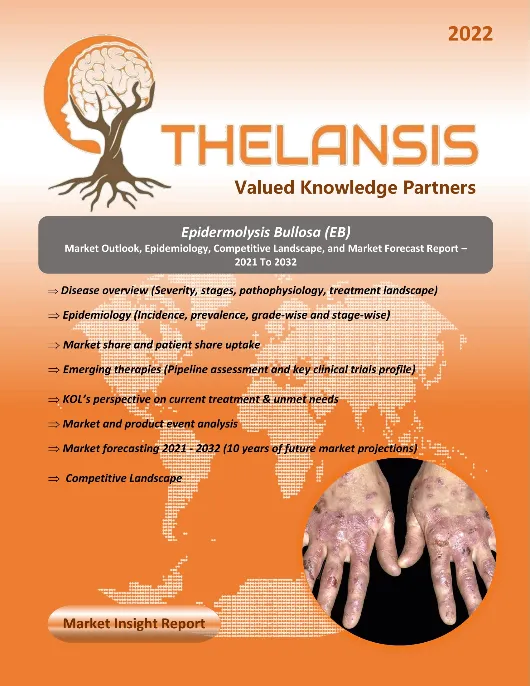Endometriosis Pain – Market Outlook, Epidemiology, Competitive Landscape, and Market Forecast Report – 2024 To 2034
- Published Date : December 18, 2024
- Updated On : October 21, 2025
- Pages : 159
Endometriosis Pain Market Outlook
Thelansis’s “Endometriosis Pain Market Outlook, Epidemiology, Competitive Landscape, and Market Forecast Report – 2024 To 2034” covers disease overview, epidemiology, drug utilization, prescription share analysis, competitive landscape, clinical practice, regulatory landscape, patient share, market uptake, market forecast, and key market insights under the potential Endometriosis Pain treatment modalities options for eight major markets (USA, Germany, France, Italy, Spain, UK, Japan, and China).
Endometriosis Pain Overview
Endometriosis is a chronic, estrogen‑driven inflammatory condition defined by the growth of endometrial‑like tissue outside the uterus. Its hallmark is debilitating pain—severe menstrual cramps, persistent pelvic pain, and painful intercourse—that directly erodes productivity, workforce participation, and quality of life. The underlying biology is complex, involving localized inflammation, cyclical bleeding, nerve infiltration, and systemic immune dysfunction, which together create a heterogeneous and difficult‑to‑manage disease state. Current treatment paradigms—hormonal suppression and repeated laparoscopic surgery—are palliative rather than curative, with recurrence rates approaching 50% and significant constraints tied to side effects, adherence, and fertility concerns.
Geography coverage:
G8 (United States, EU5 [France, Germany, Italy, Spain, U.K.], Japan, and China)
Insights driven by robust research, including:
- In-depth interviews with leading KOLs and payers
- Physician surveys
- RWE analysis for claims and EHR datasets
- Secondary research (e.g., peer-reviewed journal articles, third-party research databases)
Deliverables format and updates*:
- Detailed Report (PDF)
- Market Forecast Model (MS Excel-based automated dashboard)
- Epidemiology (MS Excel; interactive tool)
- Executive Insights (PowerPoint presentation)
- Others: regular updates, customizations, consultant support
*As per Thelansis’s policy, we ensure that we include all the recent updates before releasing the report content and market model.
Salient features of Market Forecast model:
- 10-year market forecast (2024–2034)
- Bottom-up patient-based market forecasts validated through the top-down sales methodology
- Covers clinically and commercially-relevant patient populations/ line of therapies
- Annualized drug-level sales and patient share projections
- Utilizes our proprietary Epilansis and Analog tool (e.g., drug uptake and erosion) datasets and conjoint analysis approach
- Detailed methodology/sources & assumptions
- Graphical and tabular outputs
- Users can customize the model based on requirements
Key business questions answered:
- How can drug development and lifecycle management strategies be optimized across G8 markets (US, EU5, Japan, and China)?
- How large is the patient population in terms of incidence, prevalence, segments, and those receiving drug treatments?
- What is the 10-year market outlook for sales and patient share?
- Which events will have the greatest impact on the market’s trajectory?
- What insights do interviewed experts provide on current and emerging treatments?
- Which pipeline products show the most promise, and what is their potential for launch and future positioning?
- What are the key unmet needs and KOL expectations for target profiles?
- What key regulatory and payer requirements must be met to secure drug approval and favorable market access?
- and more…
Endometriosis Pain Market Outlook
Thelansis’s “Endometriosis Pain Market Outlook, Epidemiology, Competitive Landscape, and Market Forecast Report – 2024 To 2034” covers disease overview, epidemiology, drug utilization, prescription share analysis, competitive landscape, clinical practice, regulatory landscape, patient share, market uptake, market forecast, and key market insights under the potential Endometriosis Pain treatment modalities options for eight major markets (USA, Germany, France, Italy, Spain, UK, Japan, and China).
Endometriosis Pain Overview
Endometriosis is a chronic, estrogen‑driven inflammatory condition defined by the growth of endometrial‑like tissue outside the uterus. Its hallmark is debilitating pain—severe menstrual cramps, persistent pelvic pain, and painful intercourse—that directly erodes productivity, workforce participation, and quality of life. The underlying biology is complex, involving localized inflammation, cyclical bleeding, nerve infiltration, and systemic immune dysfunction, which together create a heterogeneous and difficult‑to‑manage disease state. Current treatment paradigms—hormonal suppression and repeated laparoscopic surgery—are palliative rather than curative, with recurrence rates approaching 50% and significant constraints tied to side effects, adherence, and fertility concerns.
Geography coverage:
G8 (United States, EU5 [France, Germany, Italy, Spain, U.K.], Japan, and China)
Insights driven by robust research, including:
- In-depth interviews with leading KOLs and payers
- Physician surveys
- RWE analysis for claims and EHR datasets
- Secondary research (e.g., peer-reviewed journal articles, third-party research databases)
Deliverables format and updates*:
- Detailed Report (PDF)
- Market Forecast Model (MS Excel-based automated dashboard)
- Epidemiology (MS Excel; interactive tool)
- Executive Insights (PowerPoint presentation)
- Others: regular updates, customizations, consultant support
*As per Thelansis’s policy, we ensure that we include all the recent updates before releasing the report content and market model.
Salient features of Market Forecast model:
- 10-year market forecast (2024–2034)
- Bottom-up patient-based market forecasts validated through the top-down sales methodology
- Covers clinically and commercially-relevant patient populations/ line of therapies
- Annualized drug-level sales and patient share projections
- Utilizes our proprietary Epilansis and Analog tool (e.g., drug uptake and erosion) datasets and conjoint analysis approach
- Detailed methodology/sources & assumptions
- Graphical and tabular outputs
- Users can customize the model based on requirements
Key business questions answered:
- How can drug development and lifecycle management strategies be optimized across G8 markets (US, EU5, Japan, and China)?
- How large is the patient population in terms of incidence, prevalence, segments, and those receiving drug treatments?
- What is the 10-year market outlook for sales and patient share?
- Which events will have the greatest impact on the market’s trajectory?
- What insights do interviewed experts provide on current and emerging treatments?
- Which pipeline products show the most promise, and what is their potential for launch and future positioning?
- What are the key unmet needs and KOL expectations for target profiles?
- What key regulatory and payer requirements must be met to secure drug approval and favorable market access?
- and more…
1. Key Findings and Analyst Commentary
- Key trends: market snapshots, SWOT analysis, commercial benefits and risk, etc..
2. Disease Context
- Disease definition, classification, etiology and pathophysiology, drug targets,etc.
3. Epidemiology
- Key takeaways
- Incidence / Prevalence
- Diagnosed and Drug-Treated populations
- Comorbidities
- Other relevant patient segments
4. Market Size and Forecast
- Key takeaways
- Market drivers and constraints
- Drug-class specific trends
- Country-specific trends
5. Competitive Landscape
- Current therapies
- Key takeaways
- Dx and Tx journey/algorithm
- Key current therapies – profiles and KOL insights
- Emerging therapies
- Key takeaways
- Notable late-phase emerging therapies – profiles, launch expectations, KOL insights
- Notable early-phase pipeline
6. Unmet Need and TPP Analysis
- Top unmet needs and future attainment by emerging therapies
- TPP analysis and KOL expectations
7. Regulatory and Reimbursement Environments (by country and payer insights)
8. Appendix (e.g., bibliography, methodology)
Table of contents (TOC)
1. Key Findings and Analyst Commentary
- Key trends: market snapshots, SWOT analysis, commercial benefits and risk, etc..
2. Disease Context
- Disease definition, classification, etiology and pathophysiology, drug targets,etc.
3. Epidemiology
- Key takeaways
- Incidence / Prevalence
- Diagnosed and Drug-Treated populations
- Comorbidities
- Other relevant patient segments
4. Market Size and Forecast
- Key takeaways
- Market drivers and constraints
- Drug-class specific trends
- Country-specific trends
5. Competitive Landscape
- Current therapies
- Key takeaways
- Dx and Tx journey/algorithm
- Key current therapies – profiles and KOL insights
- Emerging therapies
- Key takeaways
- Notable late-phase emerging therapies – profiles, launch expectations, KOL insights
- Notable early-phase pipeline
6. Unmet Need and TPP Analysis
- Top unmet needs and future attainment by emerging therapies
- TPP analysis and KOL expectations
7. Regulatory and Reimbursement Environments (by country and payer insights)
8. Appendix (e.g., bibliography, methodology)


